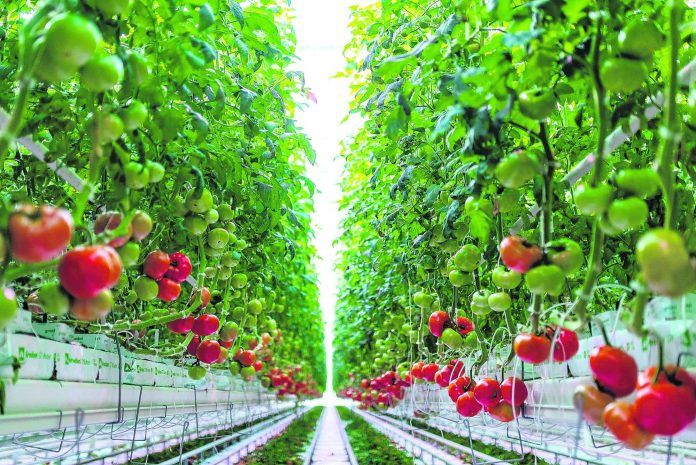
By DEE-ANN DURBIN
AP Business Writer
AppHarvest — an indoor farming company backed by Martha Stewart — thinks the agriculture sector is ripe for disruption. And now, its tomatoes are ripe for eating.
The Morehead, Kentucky-based company said Tuesday it has begun shipping beefsteak tomatoes to Kroger, Walmart, Publix and other grocers. Eventually, AppHarvest plans to ship 45 million pounds of tomatoes each year from its 60-acre indoor farm in Morehead.
AppHarvest is one of many players in the fast-growing field of indoor farming. Others include New York-based Gotham Greens, which has eight urban greenhouses across the U.S., and Plenty, a vertical farming startup in San Francisco. In a recent global survey, Agritecture Consulting — which works with urban farmers — found that at least 74 indoor farming companies were founded in 2020 alone.
The industry is getting a boost from high-tech farming techniques developed in the highly profitable cannabis industry, said Evan Lucas, an assistant professor at Northern Michigan University who heads its indoor agriculture program. Falling costs for LED lighting have also helped decrease the cost of operating indoor farms, he said.
Greenhouses have been around for decades, but not until recently have they grown into such large-scale facilities. At the same time, consumers are increasingly looking for better-tasting, sustainably produced food, Stewart said. AppHarvest uses no chemical pesticides and says its tomatoes are bred for flavor, not long-haul travel, unlike tomatoes grown in Mexico.
“We know how flavorless and devoid of nutrients tomatoes are when they are picked a month ago,” said Stewart during a video news conference Tuesday. “I think that we all need and want better food for us, for our families, for our friends.”
Stewart also wants organic produce to be more affordable and accessible. She said she was shocked when she went to the grocery last Saturday and had to pay $98 for a small cart full of organic vegetables.
AppHarvest says its Morehead greenhouse, which houses 720,000 tomato plants over the equivalent of 45 football fields, is one of the largest single-story buildings in the world. Its tomato plants will be harvested continually and can grow to 45 feet high, helping achieve 30 times the yield of a traditional farm.
Founder and CEO Jonathan Webb, a Kentucky native, said Appalachia is ideal because of its heavy rainfall. AppHarvest uses only recycled rainwater to water its plants.
But Webb said AppHarvest is also keen to invest in an economically depressed region which has long depended on coal. Webb said the Morehead farm’s 350 employees all make at least $15 per hour and have health benefits. The company received more than 10,000 applications for those spots, he said.
In addition to Stewart, “Hillbilly Elegy” author J.D. Vance is a member of AppHarvest’s board. Vance’s venture capital fund, Narya, is an investor in AppHarvest, which plans a public stock listing this year.
AppHarvest is currently building a 60-acre facility in Richmond, Kentucky, and a 15-acre facility to grow leafy greens in Berea, Kentucky. The company plans to build a total of 12 indoor farms across Appalachia by 2025.
The company has a long way to go before it makes a dent in the tomato market. In 2015, for example, the U.S. produced 2.7 billion pounds of fresh tomatoes, mostly in Florida and California. But that production only fed around 40% of demand. The rest was made up by imports from Mexico and Canada, according to a report by the University of Florida. Fresh tomato production in the U.S. has been declining over the last two decades, the report said, partly because of drought.
Webb believes AppHarvest can help reverse that trend and expand it, eventually, to many varieties of fruit and vegetables.
“That’s where agriculture, as a whole, is moving,” he said.



















